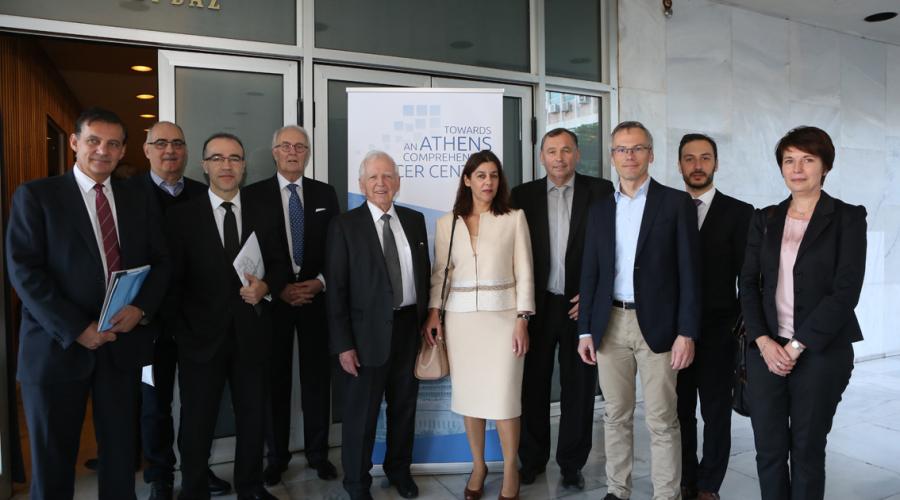
The Scientific Symposium “Towards an Athens Comprehensive Cancer Center”, took place on 13 December 2016 at the National Hellenic Research Foundation. The aim of the symposium was to bring together selected members of the German Cancer Research Center (DKFZ), the German Information Center in Athens (DAAD) and members from participating clinics and research laboratories of the Athens Comprehensive Cancer Center (ACCC), in order to integrate the German experience with the Greek needs towards the successful implementation of the ACCC scientific and management activities.
Professor Kostas Fotakis, Deputy Minister for Research and Innovation gave a welcome speech and expressed his support towards the initiative. He mentioned that the initiative of the ACCC will enhance and strengthen Greek-German scientific collaboration. He also stressed the importance of initiatives placing emphasis on research quality, strong social dimension and impact and providing new opportunities and prospects for young scientists, thus acting against the “brain-drain”.
Professor Harald zur Hausen from DKFZ, Nobel Prize in Physiology or Medicine 2008, gave a public keynote lecture on “Cancer Prevention - exemplified by the role of infections in malignancies”.During his lecture, Professor Harald zur Hausen mentioned that prevention of relatively common and frequent diseases like various forms of cancer, arteriosclerosis, Alzheimer’s and Diabetes mellitus, will only be successful when we fully understand the underlying pathomechanisms and the essential initial events resulting in respective clinical symptoms. Regarding cervical cancer prevention, he said that apart from vaccination of 8-14 year old females, vaccination of 9-14 year old males is possibly a more effective approach towards prevention.
Dr Vasilis Gregoriou, President and Director of the Administrative Board of the National Hellenic Research Foundation introduced the ACCC: “We are very happy to welcome our German colleagues and looking forward to a fruitful exchange of knowledge towards establishing the ACCC under the coordination of the NHRF. The necessity of such a center in a metropolis like Athens is beyond dispute. There are two components to this effort: one is to actually improve the health of the citizens of Athens and the other is to increase the collaboration between scientists thus bringing together the research scientist with the clinical oncologist and assign high value to what is called translational research. After several exchanged visits among cancer centers located in Athens and abroad like the German Cancer Research Center (DKFZ) Heidelberg and Royal Marsden Hospital/Institute for Cancer Research (Sutton, U.K.), we have reached a specific model for the ACCC. We are initially aiming to secure 1-2 million euros of funding for the ACCC to start operating, mostly based on the close collaboration with oncology clinics of the University of Athens and particular laboratories and research centers with top-level know-how in specific techniques, like modern diagnostic methods, gene analyses etc. Our long term aim is the establishment of a building to host oncology departments, diagnostic departments and laboratories conducting basic research, which are necessary for translational research and requires about 10-15 million Euros.”
The symposium was implemented in the framework of collaboration between the National Hellenic Research Foundation, the German Information Center in Athens (DAAD) and the German Cancer Research Center (DKFZ).
Αbout the ACCC (Scope and Objectives)
An integrated Center for Research on Cancer in Athens (ACCC- Athens Comprehensive Cancer Center) will be established involving relevant selected laboratories in research centers and universities and selected clinics in public hospitals. In addition, collaboration will be developed with companies from sectors such as pharmaceutical, biotechnology, cancer diagnostics and bioinformatics. The main objective of the ACCC will be to strengthen interdisciplinary cancer research and especially to improve the lives of patients suffering from this multi-factorial and heterogeneous disease. Researchers in Athens are already developing new diagnostic and prognostic assays, analysing and utilizing response predictors in personalized treatments and also working towards developing new drugs through chemical synthesis. The ACCC aims to develop collaborations and contribute to the transfer of knowledge to public hospitals. Today it is estimated that about 50% of the national hospital-clinics’ capacity in beds is located in the center of Athens, with usually high occupancy rates, therefore direct communication with research centers and specialized university departments is favoured, as well as collaboration with large public health units in the area of Athens and Attica.
The main objectives of the Athens Comprehensive Cancer Center (ACCC) will be to:
A. Strengthen translational research (from the research laboratory to the clinic)
B. Enhance the health of the citizens with innovative methods







